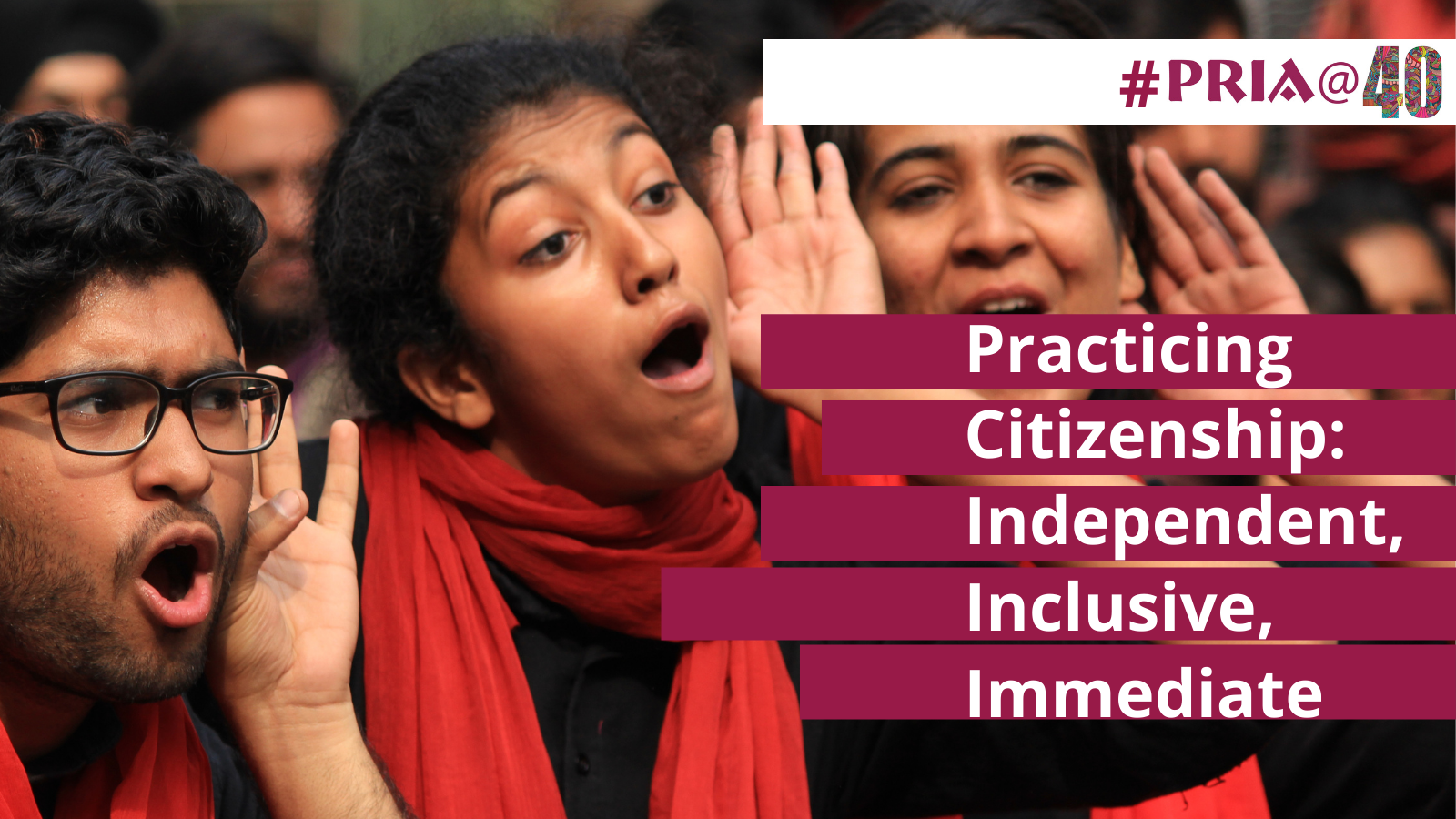
“I was told by elders that mobilising youth around menstruation issues in Bhagalpur was impossible; I went ahead anyway…” Shalini started Alharh, a campaign aimed at creating a robust community in a small town in Bihar (India), to spread awareness and smash stigma around menstrual health and hygiene.
Was this an independent, democratic act by youth, for the youth? How is such action supported? Who determines which issues are important to the youth?
Jha and several other young leaders of change from Bengaluru to Malaysia, New Delhi to China, narrated their stories and strategies as part of a conversation on Youth Participation and Active Citizenship organized on International Youth Day (August 12, 2021). They all had one passion – to support participation of youth to become active citizens.
“Young people are restless, full of energy and ideas; they are concerned about issues of equality and justice too. Support to their leadership empowers them to act on the issues important to them,” said Rohit, describing the work done by Young Leaders for Active Citizenship (YLAC), which he has co-founded.
“When pandemic struck our communities, youth in my region [China] came forward to share practical information about the infection, using digital and social media. We got spontaneously organized to communicate with and support each other.” Yappeng Ou, Member of the Interim Steering Committee, UNESCO Global Youth Community, echoed sentiments of youth around the world who demonstrated active citizenship during the pandemic.
Active citizenship is about being a responsible member of a community, society, institution. Such citizenship is practiced not by words, but by deeds of mutual respect, listening to different opinions, working together despite differences in language, religion, caste, dress, etc.
“Understanding your place in society, your rights and the discriminations you experience are integral to youth becoming active citizens,” is Poornima’s learning from her work with the Youth Work Resource Center at Samvada, Bengaluru.
Explaining the focus of PRIA’s Youth-n-Democracy Fellowship, Nikita described the importance of creating safe spaces for youth to learn democratic, constitutional values and freedoms to practice active citizenship in everyday life. Using commonplace tools of arts, music, theatre, poetry youth learn to express themselves and to listen to dissimilar others, thereby deepening their practice of citizenship.
In her work with adolescents at the Martha Farrell Foundation, Samiksha finds how universally essential such safe spaces for learning is for young people.
Freedoms in everyday life, of taking decisions and making choices, are presently constrained for youth around the world. Authentic participation by youth flows when obstacles in its pathways are removed. When capacities to understand such obstacles, in self and society, are nurtured and strengthened, practice of active citizenship by youth gains energy.
Support to youth associations, organized and led by youth, is critical to enabling such momentum. Jufitri Joha, President of the Malaysian Youth Council, provided examples from his country’s locally-operating youth associations, with opportunities to federate at provincial and national levels. The process is essentially bottom-up.
Linking local voices to global platforms, but on terms to be developed by youth themselves, was emphasized by Mirwais, Chair of the interim executive of UNESCO’s Global Youth Community. Concurring with this, Juan Pablo from UNESCO’s Delhi Cluster Office also reminded us that such youth representation in national and international platforms should not be mere symbolism.
Youth participation is neither a new phenomenon, nor is its significance new. Many significant social movements and societal changes around the world have been triggered through active youth participation. With changing demographics and technology, forms and meanings of youth participation may be changing. But the scarcity of safe spaces (including digital ones) and opportunities to express themselves without pre-conditions may well limit visibility of active citizenship by youth. Freedom of expression – at home, in the classroom, in communities, at workplaces – is foundational for learning and practising citizenship, noted educator Lalita Ramdas highlighted.
With millions of youth around the world spending many years in schools and colleges, the classroom can be a safe space, for learning the practice of active citizenship. Curricula and content are currently determined by disciplines in silos and a pedagogy based on teaching (not learning). Arguing for democratising the classroom, Dr. William Hermann Arrey, from the Protestant University of Central Africa in Yaounde, Cameroon, made a case for organically linking formal education to a student’s lived realities. Methods of experiential learning, reflecting on one’s self and community, can provide strong foundations for ‘discovering’ practices of citizenship from their own contexts. Higher education institutions can adapt their curriculum and pedagogy in ways that learning citizenship through direct engagement in society earns academic credits for students. India’s National Education Policy (2020) does emphasise the need for learning global citizenship by all students.
As India celebrates its 75th Independence Day on August 15, 2021, its society has the largest youth demographics ever in the whole world. ‘Experts and elders’, people in positions of authority, speak to (not listen to) youth, exhorting them to become future leaders of their societies. The time is now, not in the future, for young people to participate and act as active citizens. How can we support them to take such leadership and become champions in post-pandemic reconstruction of India as climate impacts, economic inequality and normative conflicts confront us?
Ms. Meghna Sandhir, along with our team members, has been engaged in the Drivers, Limiters, and Barriers to Women's Trust in Digital Platforms Project since last year. She is blogging about her firsthand experiences from visiting our project sites in India.
Ms. Aashini Goyal, along with our team, has been working on the Drivers, Limiters, and Barriers to Women's Trust in Digital Platforms Project for the past two months. This blog recounts her firsthand experiences from visiting our project site in India.
Ms. Meghna Sandhir, our programme officer, along with colleagues from Martha Farrell Foundation and Pro Sport Development, participated in the Trainers of Training (ToT) program conducted at Sahbhagi Shikshan Kendra - SSK Lucknow. The training took place from December 4th to December 10th, 2023.